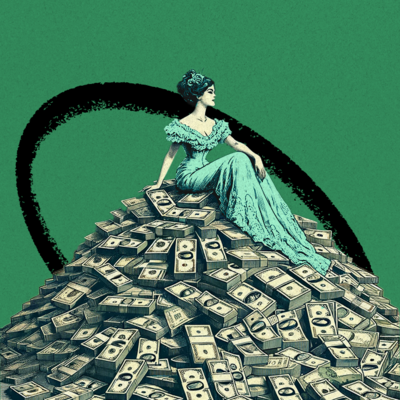Look On My Works, Ye Mighty, and Despair
I Have Some Thoughts To Share

This essay is brought to you by On Deck Scale
This article is brought to you by On Deck Scale (ODS), a close, trusted community of founders leading high-growth, venture-scale companies from around the world.
The most frequent question I get as a writer is “where do your ideas come from?” Here is my exact process.
Step 1: Whisper insults to myself while flexing in the mirror. To gather the volatile cocktail of hubris and self-hatred required for great writing, I start every day at 6AM, white-knuckling my bathroom sink, urgently telling myself I am too stupid to function.
Step 2: Scroll Twitter. This is not helpful at all, but it is important I do it anyway.
Step 3: Rip off someone else’s thoughts: Picasso once said, “Good artists borrow, great artists steal, subscription supported newsletters plagiarize.” The key to writing original ideas is not having any.
Step 4: Snort an upper and make memes until my fingers bleed. I have an army of interns that I keep locked in my basement that actually write these things. The only thing I do with my time is make memes.
Honestly…this sounds healthier than my actual method. My writing cadence is determined more by curiosity than something so banal as a “process.”
The real reason I’m able to write these posts is that I am hopelessly obsessed with technology. Thinking about companies, about finance, is what I do, night and day. From my walk in the morning to laying in bed in the evening, I am reading reading reading. Technology is pretty much all I can think about, and it has been that way for close to 10 years.
Most of the time that thinking translates into full-length posts. I get curious about something and go 3K-5K words deep. However, sometimes the fruit of that investigation isn’t juicy enough to justify a full Napkin Math post. So I have lots of >500 word ideas that have never had the opportunity to shine.
On Deck Scale (ODS) is a close, trusted community of founders leading high-growth, venture-scale companies from around the world. Our off-the-record events and curated network create a safe space for decision-making and developing frameworks that will help you scale — from seed-stage to IPO.
Join a network representing 27 countries, 9 unicorns, and $9B+ in collective capital raised.
Today, like a salmon swimming upstream, I’m going to release some of my little idea kids into the river of the internet and see what hatches (I’m doing a compilation post). We will cover private versus public valuations, what is a startup anyway, and what makes a good media business.
If you see something in here that you would like a full post on would you let me know? As always, I appreciate your patience as I wildly careen from experiment to experiment in this column. With that, on to the show.
Access Skews Asset Prices More Than Information
Let’s pretend there are two companies that are identical in every way. Except one is a public company that discloses the absolute minimum that is required by American law, and the other is a private company that offers in-depth data to investors that indicate interest. Which one will be valued higher by investors?
Really, this is a question of which creates more accurate pricing: open but generic information, or competition for deal access? I can confidently say that an investor will have much, much more data available for a deal on a private company than they would for a public company. Usually the most useful thing to know about a company are metrics around customer performance like ARPU, Churn, and NDR. None of these metrics are required disclosure for public companies. However, this is the first thing private market investors ask for! This allows them to more accurately price in risk and valuation. However, to gain access to that data and to eventually gain access to the share sale, VCs have to compete against other capital providers. For public companies, it is the exact opposite. Information is identical for everyone and broadly available. Investors can buy in at any time.
For many years, my framing was that the public companies would be valued more highly because of the easy availability of capital. I’ve changed my mind. The private company will be more highly valued because there are only two outcomes: an investor has access to the equity, or they don’t. When the amount of capital in the private markets gets too high, such as in the last few years, the prices go all out of whack. Competition for deal access essentially eats all the potential returns.
For private market investors you can essentially compete on the two axes of analysis or access. Either you can analyze a company and find value that everyone has missed, or you can get access to an obviously great deal and block out other investors. The easiest way to get access is to give ridiculous valuations to the company, thus private companies will have a higher valuation.
We’ve Lost the Technology Startup Plot
In what I thought was surely the sign of the top, in 2018, Y Combinator invested 120K into a mac and cheese restaurant. Note: It was not the top of the market. Around 2016, I was pitched by a startup importing Cambodian women’s breast milk to sell to rich Americans. Note: I passed on this one.
I bring these up because both of these companies could be considered to be a technology company by some financiers. Definitions really matter, and weirdly, there isn’t actually one that is agreed upon for what a tech startup actually is!
The technology boom that started with Intel and the semiconductors of Silicon Valley has penetrated so far into every aspect of business that you could probably make a decent argument that on some level, everything is a technology startup. And some people have: see the bloated and stupid portfolios of funds in 20-22 era.
I would say there are two things that define a startup:
- Types of Risk Embraced: Every business has a chance at failure. What matters for tech startups is why your company succeeds or fails. A tech startup embraces scientific risk, product risk. If all that is required is for you to be good at go-to-market, then you may be building something great! But it doesn’t smell like a tech startup to me, it smells like an established playbook. This type of company may and probably should receive venture dollars (looking at you B2B SaaS) but there is something about it which misses the purpose and soul of building technology.
- Financial Profile: The original impetus for venture funding was to fund something that was risky and required high amounts of upfront capital to build. From there they could turn it around and start printing lots of cash on the other side of the equation. The clearest sign of the P&L of a tech startup is high upfront investment, coupled with incredible cash flows and growth on the other side of product-market fit. Paul Graham says it is as simple as “Startup = Growth.” In YC, he pushed for startups to be growing 5-7% per week. While I think this is generally correct it is dangerous. The push for growth, especially in eras of cheap capital, means that weird stuff that grows quickly will receive funding anyways.
This brings us back to mac and cheese and Cambodian breast milk—both of these companies probably would have grown quickly. LGBT parents and adoptive parents would likely pay for access to breast milk and people do love their cheesy carbs. However, for a startup to have the true soul of what I’m describing, they have to be pushing for something more. Otherwise, it is just a regular old company. There are lots of nuances here, depending on sector and stage, but a tech startup should have a fundamental product/science risk and be aiming for spectacular, rapid growth.
Finance Is Beautiful
I failed my first finance class in college.
The simple addition and subtraction of the income statement held absolutely no interest for me. Like, money is obviously useful, but there are just so many more interesting things to study than cash flows. Andddd that is still true. Finance in isolation is dull.
However, finance in context is one of the most interesting topics there is. Its beauty is best understood in comparison. For most of what humans do, there just isn’t any agreed upon measurement that exists. Most of our output is abstract and difficult to measure. Social experiments are so fraught with error because there are just so many different ways to twist the numbers.
Finance is the opposite. Every type of for-profit organization is evaluated upon metrics that are the exact same. There are rigorous standards that companies are held to. Regardless of industry, from crypto to railroads, you can put their income statements side by side and see which has better performance.
Having a universal comparison method is insanely valuable and is really fundamental to having a functioning society. The study of finance is only boring if you just see it as number games. It is compelling if we see finance as a mechanism by which to compare and contrast human activity.
The Most Difficult Part of A Media Business is Vibe
Sometimes, I wonder what exactly it is that I get paid for.
The thing that makes me wonder is the feedback I get on posts. For most pieces I publish, I’ll get feedback from someone saying, “I really enjoyed X piece because I agree with you about Y.” The only thing is that I actually said the exact opposite in my piece. People will literally get the exact opposite takeaways from my piece. In part, this is my fault. I can always improve my analysis and the quality of my prose. On the other hand, some accountability does lay with the reader.
And this circumstance, one where the reader gets the exact opposite takeaway, isn’t limited to the inexperienced. I’ll get this feedback from investment managers or CEOs of billion dollar companies.
The weirdest part of all? Oftentimes these people are paying subscribers.
As a writer, it makes me ask the fundamental question: what are people paying me for anyways? I had initially thought it was for my analysis, but people obviously aren’t always paying close attention to that. Maybe entertainment? But in a world where TikTok exists I am a fundamentally more boring thing to spend your time on.
What I actually think people pay me for is the general vibe that I cultivate. It is the feeling that they get at the end of the piece where they think to themselves, “Ah, that was fun and I feel smarter.” Crucially, it doesn’t actually matter whether readers have gotten smarter. My compensation is dependent on the cultivation of that vibe.
While a more specific and obvious niche would likely result in a short-term monetization jump, it would be at the long term detriment of this publication. (See all the people who jumped hard onto the Web3 bandwagon over the last year.) I know that if I just started writing a bunch of stock analysis, I could make way more money. However, that will only work for so long before I get burned out and bored.
Media businesses are the exact same. There are only so many specific jobs-to-be-done available for writers to fulfill. However, there are infinite individual vibes to cultivate and sell. Vibes are smaller markets, will not grow as quickly, and will be more confusing to the layman. Crucially though, they are everlasting. As long as you haven’t decided to become a multi-billion dollar business, you can build a sustaining and meaningful media business that allows you to take creative risks and have fun. (In case it wasn’t obvious this is one of those posts).
Most media publications lose their way by sacrificing vibe in pursuit of revenue growth. As cheesy as it sounds, a media startup has a soul. The longer and more vibrantly you can make that soul shine, the better long-term business you are going to build.
Annnnnnd that’s it. Thanks for joining me on this hodgepodge experimental piece. I’ll be off next week for some much needed vacation and will be back with some bangers in the near future.
Thanks to our Sponsor: On Deck Scale
ODS helps venture-scale founders become better leaders. Work through high-impact decisions, uplevel as an operator, and build lasting relationships with peers who are at a similar stage as you.







Comments
Don't have an account? Sign up!
A full post on Finance is beautiful and The tech startup plot please!